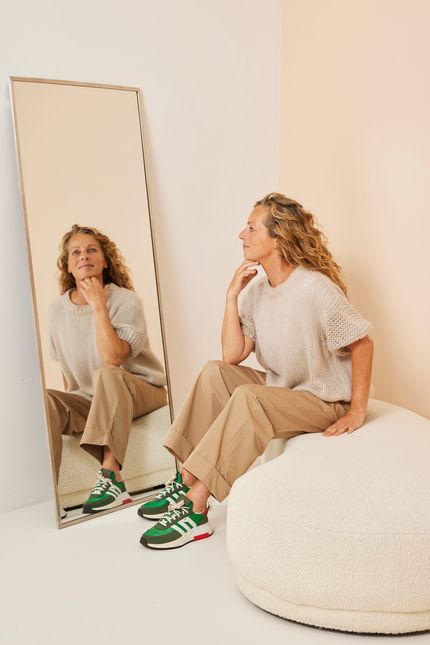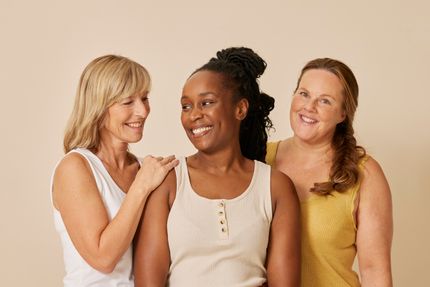Joint pain and menopause
Loss of oestrogen can affect your joints, muscles and bones. Are you starting to notice that your hands, knees or shoulders feel stiff and achy? You are not alone: 40 percent of menopausal women develop joint problems, sometimes even before the onset of other symptoms and before their last menstrual period.

I'm stiff as a board, especially in the morning. I'm seriously starting to feel like an old lady! I really hope it will get better. - Ellen (age 52)

What is happening in your body?
It's common for hormone levels to fluctuate during perimenopause. Both oestrogen and progesterone levels fall before your periods stop altogether and you become infertile. This is a natural process: your body needs to find a new balance.
Chances are the change in your body's hormones won’t go unnoticed. Oestrogen, for instance, plays a huge role in keeping your body healthy and strong by protecting against cartilage wear and tear, and keeping it flexible. When the amount of oestrogen in the body fluctuates or decreases, the cartilage can become thinner and mucous membranes start to lose moisture. As a result, bone will rub on bone, causing pain, irritation and inflammation. This may be felt throughout your body, but the joints in the hands, wrists and fingers are most often affected.
Many women also have other menopausal symptoms besides joint pain, like mood swings and severe hot flashes during the day and at night (night sweats).
Other causes of joint pain
There are also other factors that can cause muscle and joint pain, such as decreased thyroid function. Oestrogen deficiency can also play a role in the development of osteoarthritis. If you are experiencing any prolonged stiffness or pain, it's always best to see a doctor to find out what is causing your symptoms.
Osteoporosis
Low oestrogen levels can, over time, affect your bones too. Oestrogen deficiency has been linked to calcium loss. Calcium is what gives bones their strength. Low levels of oestrogen and calcium can lead to osteoporosis, a condition that weakens bones and makes them more susceptible to fractures.
Calcium also stimulates the production of collagen, which keeps cartilage and bones healthy and strong. Less calcium means less collagen, and therefore, less dense bones and tissues.
Calcium, collagen and oestrogen are connected: you lose one, you lose the others. If you don't make any healthy changes to your diet or lifestyle habits, your bones will lose calcium for about 10 years. This process can be slowed down through sufficient exercise and eating a healthy diet.
What can you do?
Your hormone levels are going to decline. That’s a fact. But a healthy lifestyle can do a lot to keep your muscles, bones and joints strong as you age and alleviate menopausal symptoms and discomfort. These tips have been proven to be effective in reducing or even reversing damage to bones, muscles and joints.
- Exercise daily, even if it’s uncomfortable. Opt for low-impact sports such as yoga, walking or swimming (or activities such as gardening) rather than high-impact sports such as running or boxing.
- Strength training is also recommended. Activities that put pressure on the bones strengthen both the muscles and the bones. This is because the bones are stimulated to produce more bone tissue when they are stressed.
- Pack your diet with vegetables and fruit. Leafy green vegetables contain magnesium, which is good for your joints.
- Get enough omega-3. Omega-3 fatty acids help all the cells in your body function as they should. Eat fatty fish (salmon, mackerel, herring) twice a week. Struggling to get enough omega-3 from your diet? Then consider taking a supplement.
- Support your health with supplements. Many women with joint pain benefit from taking supplements with omega-3, magnesium and calcium. Added bonus: omega-3 has a calming effect and improves mood, sleep and energy. Vitamin D enhances intestinal absorption of calcium. This is especially important during the winter months when your skin makes less Vitamin D due to the lack of sunlight.
- Some women benefit from collagen supplements, possibly with a Vitamin C supplement (to boost collagen production). Collagen is the most abundant protein in the body and helps keep joints and muscles strong and flexible.

Support your body
Is joint pain making your menopausal years miserable? There are several things you can do to keep your joints supple and reduce stiffness and pain. View your options.

What treatment is right for you?
Our top tip for keeping joint problems at bay is regular exercise and a healthy, protein-rich diet. If this isn’t enough to alleviate your symptoms, then non-steroidal anti-inflammatory drugs (NSAIDs) can help.
Non-hormonal medication
Non-steroidal anti-inflammatory drugs (NSAIDs) are used to reduce pain and inflammation in patients with joint pain. NSAIDs that is commonly used to treat joint pain is Arcoxia. This medicine reduces pain and swelling by blocking the action of an enzyme in the body involved in inflammatory responses. This can help to make joints more supple.

Physical activity is the best medicine. Keep moving, even if you feel stiff. If the pain gets really bad, taking the right painkillers can help a lot. - Florine (age 55)

Can hormone therapy help?
Hormone replacement therapy (HRT) treats symptoms of menopause like hot flashes, night sweats and vaginal dryness by replacing lost hormones (oestrogen and progesterone). Do you also have other symptoms besides joint pain? Then HRT might be an option for you.
Sources
- Bello AE, Oesser S. (2006). Collagen hydrolysate for the treatment of osteoarthritis and other joint disorders: a review of the literature. PMID: 17076983.
- The North American Menopause Society. (2021). Management of osteoporosis in postmenopausal women: the 2021 position statement of The North American Menopause Society. https://journals.lww.com/menopausejournal/fulltext/2021/09000/management_of_osteoporosis_in_postmenopausal.3.aspx.
- The North American Menopause Society. (2001). The role of calcium in peri-and postmenopausal women: consensus opinion of The North American Menopause Society. https://journals.lww.com/menopausejournal/abstract/2001/03000/the_role_of_calcium_in_peri_and_postmenopausal.3.aspx.
- Magliano M. (2010). Menopausal arthralgia: Fact or fiction. PMID: 20537472.
- NHG-werkgroep: Janssens HJEM, Lopuhaä DE, Schaafstra A, Shackleton DP, Van der Helm-Van Mil AHM, Van der Spruit R, Van Peet PG, Wiersma, Tj, Woutersen-Koch H. (2017). Artritis. https://richtlijnen.nhg.org/standaarden/artritis
Your path to a smooth menopause starts here
Get the tools you need to navigate menopause with more ease and to educate yourself about your body. With tips and insights from experts, and relatable stories of women just like you. Press play, not pause.
Tips and advice


FAQ
I suffer from painful joints, what can I do?
If the amount of oestrogen in your body fluctuates, you may notice it in your bones and joints. Most important? Keep moving, even if you are stiff or immobile. Moving less will only make the pain or stiffness worse. More on joint pain.












